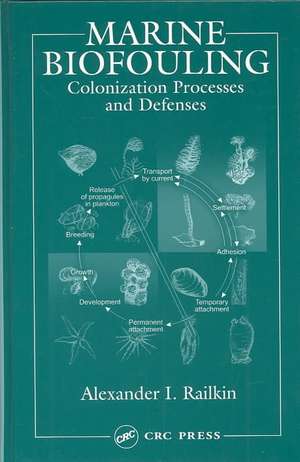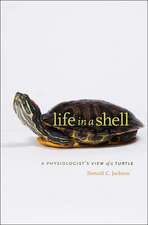Marine Biofouling: Colonization Processes and Defenses
Autor Alexander I. Railkinen Limba Engleză Hardback – 29 dec 2003
Marine Biofouling: Colonization Processes and Defenses is the English language version of a comprehensive work by eminent Russian scientist Alexander I. Railkin, who details the causes of vast biomass concentrations on submerged hard substrates. He also delivers a quantitative description of colonization processes and provides detailed models for preventing biofouling.
This volume expounds on many topics rarely discussed in the frame of one book: types of hard substrate communities; comparison of hard and soft substrate communities; harm caused by micro- and macrofoulers; larval taxes and drift; mechanisms of settlement and attachment of microorganisms, invertebrates, ascidians and macroalgae; the impact of currents; protection from epibionts; industrial biofouling protection; successions on hard substrates; and the recovery of disturbed communities or the self-assembly of communities. The text includes much Russian-language research translated for the first time.
Through a thorough examination of substrate organisms and an exploration of preventive methods, this monograph prepares those concerned with marine biology to help protect the self-purifying organisms that keep marine ecosystems healthy and productive.
| Toate formatele și edițiile | Preț | Express |
|---|---|---|
| Paperback (1) | 370.25 lei 6-8 săpt. | |
| CRC Press – 29 ian 2020 | 370.25 lei 6-8 săpt. | |
| Hardback (1) | 1214.72 lei 6-8 săpt. | |
| CRC Press – 29 dec 2003 | 1214.72 lei 6-8 săpt. |
Preț: 1214.72 lei
Preț vechi: 1633.33 lei
-26% Nou
Puncte Express: 1822
Preț estimativ în valută:
232.47€ • 240.15$ • 193.47£
232.47€ • 240.15$ • 193.47£
Carte tipărită la comandă
Livrare economică 25 martie-08 aprilie
Preluare comenzi: 021 569.72.76
Specificații
ISBN-13: 9780849314193
ISBN-10: 0849314194
Pagini: 316
Ilustrații: 67 b/w images, 21 tables, 5 halftones and 43 equations
Dimensiuni: 156 x 234 x 22 mm
Greutate: 0.74 kg
Ediția:1
Editura: CRC Press
Colecția CRC Press
ISBN-10: 0849314194
Pagini: 316
Ilustrații: 67 b/w images, 21 tables, 5 halftones and 43 equations
Dimensiuni: 156 x 234 x 22 mm
Greutate: 0.74 kg
Ediția:1
Editura: CRC Press
Colecția CRC Press
Public țintă
Professional, Professional Practice & Development, and Professional ReferenceCuprins
Communities on Submerged Hard Bodies. Biofouling as a Process. Temporary Planktonic Existence. Settlement of Larvae. Induction and Simulation of Settlement by a Hard Surface. Attachment, Development, and Growth. Fundamentals of the Quantitative Theory of Colonization. General Regularities of Biofouling. Protection of Man-Made Structures against Biofouling. Ecologically Safe Protection from Biofouling. The General Model of Protection Against Biofouling.
Recenzii
"The organization of this book breaks down this complex problem into its fundamental biological and ecological components. … This is an important reference resource for specialists of all kinds."
- Southeastern Naturalist, Vol. 3, No. 3, 2004
"The English translation of this monograph makes accessible for the first time a great number of Russian-language works on an important topic of marine ecology. …the writing is scientific and technical, the information is of great value both to biologists and to those practicing marine trades."
-Northeastern Naturalist, Issue 12/4, 2005
- Southeastern Naturalist, Vol. 3, No. 3, 2004
"The English translation of this monograph makes accessible for the first time a great number of Russian-language works on an important topic of marine ecology. …the writing is scientific and technical, the information is of great value both to biologists and to those practicing marine trades."
-Northeastern Naturalist, Issue 12/4, 2005
Descriere
This highly respected work by the eminent Alexander Railken delivers a quantitative description of colonization processes and detailing ways to prevent biofouling. Taking a complex problem, he breaks it down into its fundamental ecological and biological components. Providing a depth of coverage rarely found in a single text, he expounds on organism locomotor reactions, larvae drift, settlement and attachment mechanisms, current impact, protection from epibionts, industrial biofouling protection, and ecological biofouling control. Offering a detailed examination of substrate organisms and preventive methods, this volume elaborates on how we can protect self-purifying organisms from biofoulers.











